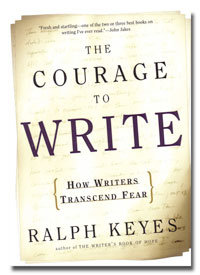
Anxiety is routine among anyone who dares to put pen to paper, or fingers to keyboard. Yet it’s rarely addressed in books about writing. The Courage to Write confronts this topic head-on. Ralph Keyes’s message is not that one shouldn’t be scared. Rather, his book treats fear as a normal, inevitable part of the writing process. Keyes illustrates this point by showing how successful writers deal with what he calls “page fright.” “I have to talk myself into bravery with every sentence,” admitted Cynthia Ozick.
In The Courage to Write, Ralph Keyes shows that anxiety is felt by writers at every level. Drawing on 30 years as an author and writing teacher, Keyes argues that this is inevitable. In his words, “Anxiety is a normal, manageable, and even a useful part of the writing process.”
A normal fear of writing can be transcended. Doing so first calls for identifying the fears of those learning to write. Among them are: fear of self-revelation, fear of being criticized, and fear of self-discovery. Topics covered in The Courage to Write include:
- Why it’s so hard to face the blank page.
- Procrastination: the “as soon as” syndrome. (“As soon as ________, I’m going to get some writing done.”)
- False fear-busters. True courage-boosters.
- How writers use obfuscation to soothe writing nerves. Helping new ones to learn the courage to write clearly.
- Confronting anxiety about the opinion of important others (“What’s Mom gonna think?”). Peer fear. Censors-in-Chief.
- Converting the fear of writing into excitement.
The Courage to Write is also a powerful motivator. The book’s author, said one reader, “wrote this for me, and in many ways, about me.”
